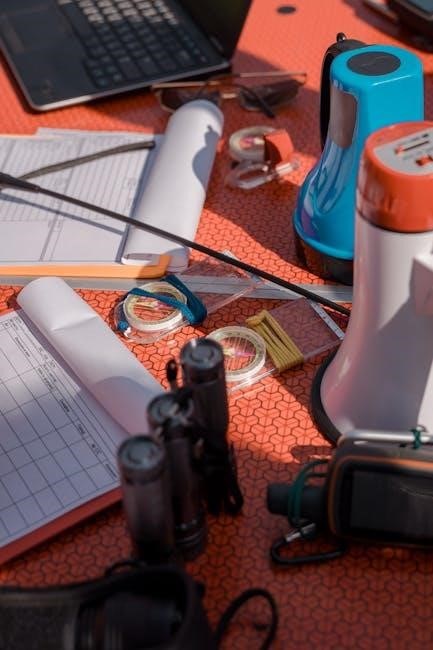Assembling an office chair requires clear instructions and proper steps to ensure safety and efficiency. Office chair assembly instructions PDF guides provide detailed tool lists, diagrams, and sequences to help users successfully build their chairs. These manuals often include safety precautions, component identification, and troubleshooting tips to make the process smooth and error-free.
Importance of Following Assembly Instructions
Following assembly instructions for an office chair is crucial for ensuring safety, stability, and proper functionality. Office chair assembly instructions PDF guides help users identify all components, tools, and steps required, minimizing errors. Incorrect assembly can lead to structural weaknesses, safety hazards, or damage to the chair. By adhering to the instructions, users can avoid costly mistakes and ensure the chair meets ergonomic standards. Proper assembly also guarantees optimal performance, longevity, and comfort. Always verify parts, use recommended tools, and follow safety precautions to achieve a secure and functional result. This attention to detail ensures the chair is both durable and safe for daily use.
Overview of the Assembly Process
The assembly process for an office chair typically begins with unpacking and verifying all components. The next step involves assembling the base, attaching the casters, and securing the gas lift. Following this, the seat plate and cushion are mounted, and the backrest is installed. Armrests are then attached, and final adjustments are made to ensure stability and comfort. Each step is logically sequenced to build the chair from the ground up. Proper alignment and tightening of bolts are emphasized to ensure durability. The process requires attention to detail and adherence to the provided instructions to achieve a sturdy and functional result. Always refer to the office chair assembly instructions PDF for specific guidance tailored to your chair model.

Key Components of an Office Chair
An office chair consists of several essential components that contribute to its functionality and comfort. The base and casters provide stability and mobility, while the gas lift allows for height adjustment. The seat plate supports the seat cushion, and the backrest offers upper body support. Armrests enhance comfort, and the tilt mechanism enables reclining. Lumbar support is crucial for posture, and adjustable features like seat height and armrests ensure customization. Each part plays a vital role, as outlined in the office chair assembly instructions PDF, ensuring proper assembly and functionality. Understanding these components helps in identifying and assembling them correctly, leading to a safe and comfortable seating experience.

Preparing for Assembly

Successful assembly begins with proper preparation. Unpack and verify all parts against the office chair assembly instructions PDF to ensure nothing is missing or damaged. Gather the required tools and materials, and choose a spacious, flat workspace. Clear the area to avoid obstacles and ensure safety; Read through the manual to understand the process, and organize components for easy access. Preparation is key to a smooth and efficient assembly experience.
Unpacking and Verifying All Parts
Begin by carefully opening the packaging and removing all components to avoid damage. Lay out the parts on a clean, flat surface. Refer to the office chair assembly instructions PDF to identify and confirm the inclusion of essential components like the base, gas lift, seat plate, backrest, armrests, casters, and hardware. Check for any visible damage or defects. If a part is missing or damaged, contact customer support immediately. Organize the parts in a logical order to ensure easy access during assembly. This step is crucial to prevent delays and ensure all components are accounted for before proceeding. Proper verification guarantees a smooth assembly process and adherence to the instructions provided in the manual.

Tools and Materials Required
To assemble your office chair, gather the necessary tools and materials as specified in the office chair assembly instructions PDF. Typically, you will need an Allen wrench (3mm or 5mm), a screwdriver (Phillips or flathead), and possibly a rubber mallet for tapping parts into place. Some chairs may require additional tools like a torque wrench or pliers. Ensure all tools are within reach to streamline the process. Refer to the manual for a detailed list, as requirements may vary by model. Having the correct tools ready will prevent delays and ensure a successful assembly. Double-check the PDF to confirm no special materials are needed beyond what’s provided in the package.
Choosing the Right Workspace
Selecting a suitable workspace is crucial for a smooth assembly process. Ensure the area is clean, flat, and large enough to accommodate all chair components. A sturdy table or workbench is ideal, as it provides a stable surface for assembly. Avoid carpets or soft surfaces that may cause parts to roll away or get lost. Good lighting is essential to see small details and instructions clearly. Keep all tools and materials within easy reach to save time. Additionally, consider the floor type to prevent damage from potential spills or scratches. A well-prepared workspace will make the assembly process efficient and stress-free. Always refer to the office chair assembly instructions PDF for specific workspace recommendations tailored to your chair model.

Step-by-Step Assembly Guide
A detailed, easy-to-follow guide to assembling your office chair, organized into clear, logical steps. Covers essential tasks from base assembly to final adjustments, ensuring a smooth process.
Assembling the Base and Casters
Start by attaching the casters to the base using the provided bolts. Ensure they are securely tightened with an Allen wrench. Next, align the base wheels evenly and verify stability. Place the base on a flat surface to prevent rolling. Use the included hardware to connect the caster wheels firmly to the base plate. Double-check that all bolts are tightened properly to avoid loose parts. Once assembled, test the base by gently rocking it to ensure even balance and smooth caster movement. Properly assembled, the base will provide a stable foundation for the rest of the chair.
Attaching the Gas Lift and Seat Plate
Align the gas lift cylinder with the seat plate, ensuring the stem fits securely into the socket. Gently push the gas lift into place until it clicks. Use the provided collar or retaining ring to secure the connection. Tighten the screws or bolts firmly with an Allen wrench, following the manufacturer’s torque specifications. Double-check that the gas lift is properly seated and stable. Once attached, test the mechanism by gently pressing down on the seat plate to ensure smooth height adjustment. Proper installation ensures the chair’s height adjustment feature functions safely and efficiently. Always refer to the official manual for specific torque values and tightening sequences.
Installing the Backrest and Armrests
To install the backrest, align the mounting brackets with the seat plate and secure them using the provided bolts or screws. Tighten firmly with an Allen wrench, ensuring stability. For the armrests, attach them to the side brackets on the seat or backrest, depending on the chair design. Adjust the armrests to your preferred height and width using the built-in mechanisms. Ensure all connections are snug and test the armrests for proper movement. Finally, verify that the backrest is securely attached and adjust its angle or height as needed. Refer to the manual for specific bolt torque values and adjustment instructions to ensure a safe and comfortable setup.
Securing the Seat Cushion and Backrest

Adjusting and Customizing Your Office Chair
Customize your chair by adjusting seat height, lumbar support, and armrests for optimal comfort and ergonomics. Ensure proper posture and reduce fatigue with personalized settings.
Adjusting Seat Height and Tilt
To ensure optimal comfort, adjust the seat height by using the gas lift mechanism. Stand beside the chair and pull the height adjustment lever while lowering or raising the seat to your desired position. The seat height should allow your feet to rest flat on the floor or on a footrest, with knees at or below hip level. Next, adjust the tilt function by leaning back slightly and using the tilt tension knob to set the resistance. Proper tilt adjustment ensures balanced support, reducing strain on your back. Fine-tune these settings while seated to achieve a comfortable posture and maximize ergonomics. Regular adjustments can enhance your overall seating experience and prevent fatigue.
Customizing Lumbar Support and Armrests
Customizing the lumbar support and armrests is essential for personalized comfort. Most office chairs feature adjustable lumbar mechanisms, often controlled by a knob or lever under the seat. Turn the knob to adjust the lumbar curvature, ensuring it aligns naturally with your lower back. For armrests, adjust the height by pressing the release button or turning the adjustment knob. Position them to support your elbows at a 90-degree angle, with wrists straight. Some chairs also allow lateral adjustment for width. Proper customization ensures even weight distribution, reduces muscle strain, and promotes a neutral spinal alignment. Experiment with settings while seated to find the most comfortable configuration for your body. Regular adjustments can help maintain optimal posture and reduce fatigue during long work hours.
Ensuring Proper Ergonomic Setup
Proper ergonomic setup is crucial for comfort and long-term health. Start by adjusting the chair height so your feet rest flat on the floor or a footrest, with knees at or below hip level. The seat depth should allow a gap of 2-4 inches behind your knees to avoid pressure. Position the backrest to support your natural spine curve, ensuring the lumbar section aligns with your lower back. Armrests should be set to support your elbows at a 90-degree angle, with wrists in a neutral position. Keep your monitor directly in front of you at eye level and keyboard within easy reach. Regularly adjust these settings and take breaks to maintain comfort and prevent fatigue.

Safety Precautions and Maintenance
Always wear gloves and ensure a clear workspace to avoid accidents. Follow the manual carefully and tighten all bolts securely. Regularly lubricate moving parts and inspect for wear.
Important Safety Tips for Assembly
To ensure a safe assembly process, always wear protective gloves and safety glasses. Clear the workspace of clutter and tripping hazards. Avoid wearing loose clothing that could get caught in parts.
Follow the instructions step-by-step without skipping stages. Use the correct tools to prevent damage or injury. Keep children and pets away from the assembly area.
If a part feels unstable, stop and reassess. Never force parts together, as this may cause breakage. Be cautious with sharp edges or heavy components.
If unsure about a step, consult the manual or seek assistance. Proper assembly ensures safety and longevity of your office chair. Always double-check tightened bolts before use.
Cleaning and Maintaining Your Office Chair
Regular cleaning and maintenance are essential to extend the lifespan of your office chair. Start by vacuuming or wiping away dust and debris from the seat, backrest, and armrests. For fabric or mesh chairs, use a mild detergent mixed with warm water and a soft cloth to gently scrub stains. Avoid harsh chemicals or abrasive cleaners, as they may damage the material. For leather chairs, use a leather-specific cleaner and conditioner to maintain suppleness. Dry the chair thoroughly after cleaning to prevent moisture buildup. Inspect and tighten any loose screws or bolts periodically. Lubricate moving parts, such as casters or tilt mechanisms, to ensure smooth operation. Regular maintenance helps preserve both functionality and appearance, keeping your chair comfortable and durable for years to come.
Troubleshooting Common Assembly Issues
During assembly, common issues may arise, such as parts not fitting or screws not aligning properly. If a part feels too tight or misaligned, double-check the instructions and ensure all components are correctly oriented. For wobbly chairs, verify that all bolts are securely tightened and the base is evenly adjusted. If the gas lift doesn’t function, ensure it’s properly attached to the seat plate and the weight limit isn’t exceeded. For stuck or uneven adjustments, lubricate moving parts with silicone spray. If issues persist, refer to the official manual or contact customer support for guidance. Addressing these problems early ensures a stable and functional chair.

Additional Resources and Support
- Access the official assembly manual for detailed guidance.
- Contact customer support for inquiries.
- Visit online forums for additional tips and troubleshooting advice from users.
Accessing the Official Assembly Manual
The official assembly manual is a crucial resource for guiding you through the office chair assembly process. It is typically available as a downloadable PDF on the manufacturer’s website or included in the packaging. Ensure you download the correct version specific to your chair model for accurate instructions. The manual provides detailed step-by-step guidance, diagrams, and safety precautions. Before starting assembly, review the manual thoroughly to understand each part and tool required. If you cannot find the manual online, contact customer support for assistance. Always refer to the official manual to avoid errors and ensure a smooth assembly experience. Proper use of the manual guarantees a safe and efficient process.
Warranty and After-Sales Support
Understanding the warranty and after-sales support for your office chair is essential for a hassle-free assembly and ownership experience. Most manufacturers offer a warranty that covers defective parts and labor for a specified period, typically ranging from 1 to 5 years. Check the warranty terms provided with your chair to know what is covered. For assembly-related issues, contact the manufacturer’s customer support team via email, phone, or live chat. Many companies also provide extended support through online portals or dedicated service centers. Ensure you register your product and keep the purchase receipt for warranty claims. This support system ensures you can address any concerns promptly and efficiently. Proper documentation is key to a smooth process. Regular updates on warranty terms are recommended for optimal benefits.
Online Communities and Forums for Assistance
Online communities and forums are invaluable resources for office chair assembly assistance. Platforms like Reddit, Facebook Groups, or specialized furniture forums often host discussions where users share their assembly experiences and tips. Many forums feature detailed guides, troubleshooting advice, and even user-created video tutorials. These communities can be particularly helpful for resolving common issues or clarifying confusing instructions. Additionally, you can ask specific questions and receive tailored advice from experienced individuals. Some forums also offer reviews and recommendations for tools or replacement parts. Engaging with these communities can enhance your assembly process and provide reassurance when encountering challenges. Active participation in these spaces fosters a supportive environment for DIY enthusiasts and professionals alike. Always verify advice against your specific chair model and instructions to ensure accuracy and safety.
Successfully assembling your office chair gives a sense of accomplishment and ensures optimal comfort and functionality for daily use.
Final Checks Before First Use
Before using your newly assembled office chair, perform a final inspection to ensure all components are securely attached and properly aligned.
- Check that all bolts and screws are tightened to the manufacturer’s specifications.
- Verify that the gas lift operates smoothly and the seat height adjusts correctly.
- Ensure the armrests, backrest, and lumbar support are firmly attached and functional.
- Test the wheels or casters to confirm they roll freely without obstruction.
- Inspect the seat cushion and backrest for proper alignment and secure attachment.
Once everything is confirmed to be in working order, your chair is ready for safe and comfortable use.
Enjoying Your Newly Assembled Office Chair
After successfully assembling your office chair, take a moment to appreciate the fruits of your labor. Sit comfortably and adjust the settings to your preferred position. Ensure the chair feels stable and supportive, providing the perfect balance of comfort and ergonomics. Test the recline function, armrest height, and lumbar support to personalize your experience. Regularly using a well-assembled chair can improve posture, reduce fatigue, and enhance productivity. Maintain your chair by following the manufacturer’s care instructions and enjoy the long-term benefits of your new workspace companion.

- Adjust the chair to fit your body perfectly.
- Take breaks to stretch and move throughout the day.
- Customize settings for optimal comfort.
















































































